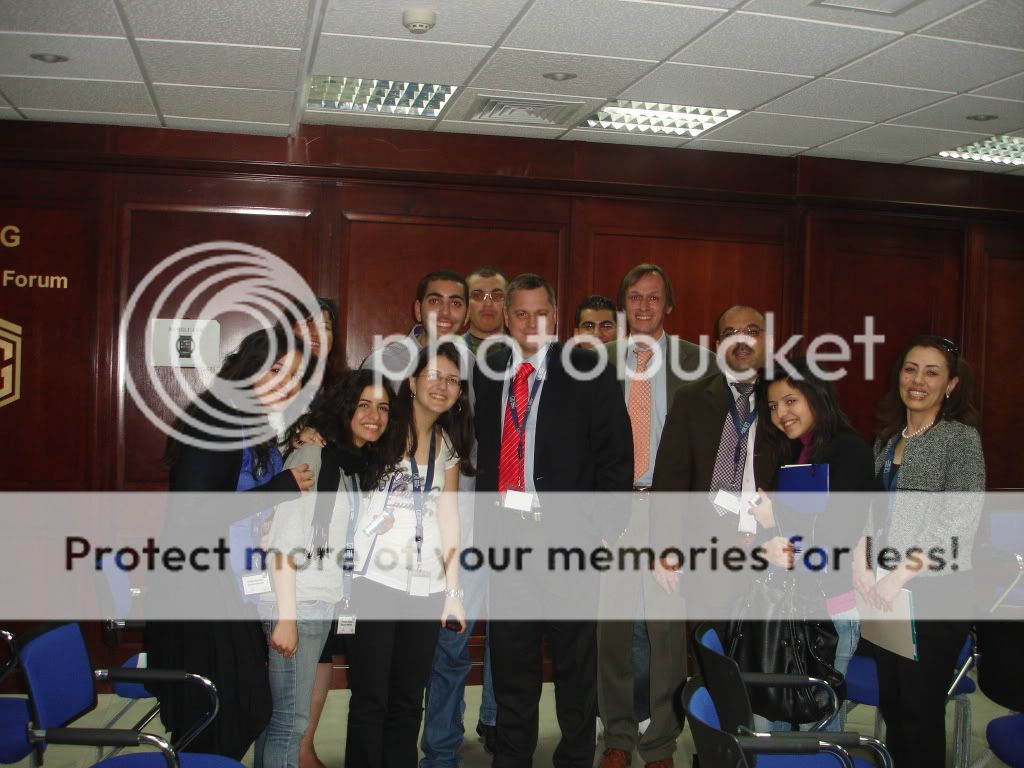1. Program Overview
Saturday, March 13th, 2010
Opening: Welcome Speech and Introductory Note
President, German-Jordanian University Dr. Labib Khadra
Resident Representative KAS Amman Dr. Martin Beck
Session I:
Comparison of Social Market Economy and Free Market Economy
Jordan’s Transition to Market Economy: Prospects and Challenges
Dr. Mohammed Ja’fari - General Director, Deposit Insurance Corporation
Social Market Economy: German Experience and Perspective
Dr. Marc Piazolo - Professor of International and Monetary EconomicsUniversity of Applied Sciences Kaiserslautern
Chair / Moderator: Dr. Hesham Gharaibeh - Dean, Talal Abu Ghazaleh College of Business
Student Working Groups
Sunday, March 14th, 2010
Session II:
Comparative Economic Systems in the Context of Nationaland International ChallengesCompeting Economic Systems:
From Planned Economy to Market Economy
Dr. Peter Uecker: Vice President, German-Jordanian University
The German Social Market Economy: Is it an Option for Jordan?
Dr. Marcus Marktanner - Assistant Professor, American University of Beirut
Chair / Moderator: Dr. Awni Mufleh, Jordan Investment Board
Student Working Groups

Closing Session and Students’ Presentation on the working groups
Dr. Talah Arabiyat - Vice Dean, Talal Abu Ghazaleh College of Business
Dr. Martin Beck - Resident Representative, KAS Amman
2. Objectives
The German concept of Social Market Economycarries a great inherent opportunityalso for the economic policies of the NearEast. The idea of preserving a free marketmechanism while offering a social balancingsystem provides a shining example forcountries like Jordan to model itself on apossible economical and social basis. Thetransfer of the social market economy tocountries of the MENA-region is, however,quite difficult. Cultural, Historical and socioeconomicdifferences as well as institutionalpath dependence are strong parameterswhich could shape decisively the transitionalprocess. During the two days lasting workshopof March 13th and 14th, 2010, organizedby the Amman office of the Konrad-Adenauer-Foundation, the Talal AbuGhrazaleh College of Business (TAGBC) andthe German-Jordanian University (GJU),over 50 participants from the private, scientificand education sector discussed the conceptof social market economy. One importantquestion which aroused in this regardwas whether this German economic conceptcould be regarded as a suitable model forthe Jordanian economy.
Four keynote speakers introduced on bothworkshop days the students of GJU’s facultyof Economics into the topic of social market economy in comparison to the Jordanianmarket economy. Subsequently some selectedtrainers like Dr. Markus Marktanneror Dr. Ghazi Samawi led discussionson topics such as “Social Market Economy –A Model for Jordan?” or “General Characteristicsof the Jordanian Economy” in differentworking groups. The students presented atthe end of the workshop their independentlycompiled work results and discussed thesewith the participating experts.
3. Details
Dr. Labib Khadra underlined in the openingsession of the workshop the essentialrole of universities in imparting knowledgeon democratic and social values. He consideredthe workshop of KAS, TAGBC and GJUas crucial for enhancing a cross-culturalawareness of the social market economy inthe Arab World. Dr. Martin Beck, residentrepresentative of the Konrad-Adenauer-Foundation in Amman, adverted the participants,after a general welcoming and acknowledgementto GJU and TAGBC, to the“Guidelines for Prosperity, Social Justice andSustainable Economic Activity” and highlightedthe role of the subsidiarity and solidarityprinciples.
Dr. Uecker dealt with the participation ofthe GJU students at the workshop. Contraryto the previous events with KAS, this timethe students were granted the opportunityto participate actively in the workshop “as asuitable preparation for their future professionallive”.
Dr. Al-Ja’fari discussed various aspects ofJordan’s transition to a market economy.Tough economic, political and social reformshad initiated this transition in recent years,the Jordanian socially responsible economicsystem faces huge challenges due to theglobal financial crisis. In exemplifying thecritical economic situation of the Jordanianeconomy during the 1970ies and at the beginningof the 1980ies, Dr. Al-Ja’fari explainedthe structural and politico-economicproblems of the country, which decisivelyaffected the economic growth throughoutthe year 2009 negatively.
At the beginning of the oil crisis in the1970ies and after the seconded shockcaused by the Iranian Revolution in the1980ies the Jordanian economy has gonethrough hard times. Jordan witnessed thedevaluation of the Jordanian Dinar by 50%,real GDP contracted by 13%, while inflationjumped to over 25%. Unemployment nearlydoubled to about 20%. The most damagingimpact was on poverty: the percentage ofthe population below the poverty line increasedto 14.4% in early nineties. Thisslowdown in economic activity and the significantmacroeconomic instability weredragged by the International MonetaryFund’s stabilization programs which focusedmainly on the demand side and managed torestore and maintain the fiscal and monetarystability. However, these measures didnot manage to build a solid foundation forsustainable economic growth. Only after institutionalizinga cooperation agreement betweenthe private and public sectors in the1990ies and the formation of the EconomicConsultative Council has the transition tosocial market economy in Jordan startedthanks to liberalization plans, free tradeagreements and privatization programs.
According to Dr. Al Ja’fari the Jordaniangovernment should undertake measures tostrengthen the political infrastructure, especiallyto improve the government functioningand the participation of the politicalcommunity, in order to avert the impact ofthe global financial and economic crisis.
Dr. Marc Piazolo revealed in his speechthe historical development and the mainobjectives of the social market economy inGermany. On the basis of different graphsand statistics he showed that the socialmarket economy enjoys high acceptanceamong the German population and that itperforms well in the international comparisonregarding the gross domestic product,the national debt, the unemployment rate,the social security services and the incomeinequality. In the following discussion participantsand experts debated the questionif a deregulation of the exchange rate couldimprove the stagnant economic situation inJordan. According to the experts it is clearthat the settlement of the exchange rate reduces speculation and stabilizes the exchangerate expectations. A controversyarouse over the question whether the Jordanianeconomy was disadvantaged by theprivatization process. Dr. Al Ja’fari was ofthe opinion that some privatization measuresshould be reconsidered and that thefree trade agreements should be alsoopened to privatization.
Following the discussion, the students weredivided into working groups and assigned tothe trainers. Dr. Markus Marktanner workedwith his student group on the concept of theWashington Consensus using the exampleof the transition from Arab socialism to freemarket economy. The outcome of the intergroupteamwork groups was summarized ina panel discussion. The students pointed outthat a gradual stabilization of the economy,politico-economic liberalization, deregulationand privatization will lead to a sustainableeconomic growth and a consistent democratizationprocess. They also highlighted theimportance of social services for a sustainablesocietal development.
In the working group of Dr. Ghazi Samawithe students confronted the advantages anddisadvantages of the Jordanian economy.The small, opened, mixed and state controlledeconomy is of best advantage forJordan. The high state expenditures, thelow demand, the export of skilled labourforce and the lack of crucial resources affectJordan’s economy adversely.
After a short welcoming speech Dr. AwniMufleh opened the seconded session onMarch 14th, 2010, with a statement on thedifferent market systems which were discussedduring the first day of the workshop.
He emphasized the importance of thesecomparisons between different market systemsand said that they help understandingthe concept of social market economy. Dr.Uecker addressed the specific social andpolitical circumstances which led to theGerman economic miracle and the developmentof the social market economy. Thetransformation process of the German societyand economic system, which destroyedthe outworn political and economic structures,was the result of the consequences ofWorld War II.
Following the description of his personal experienceswith the transition from the nationalsocialist economic system in Germanyto the economic miracle in the 1950ies and60ies and the development of the socialmarket economy, the workshop was temporarilyinterrupted. The participants weregranted the unique opportunity to assist thesigning of a cooperation agreement betweenthe Talal Abu Ghazaleh Organization andthe Word Trade Organization (WTO) in thepresence of Mr. Talal Abu Ghazaleh himself.
Dr. Marcus Marktanner continued theworkshop afterwards analyzing whether theconcept of social market economy is a suitablemodel for Jordan’s economic system.He gradually defined the principles of thesocial market economy and went on explainingthe concept of Ordoliberalism. Inthe following he explored the questionwhich sectors are regulated by the socialmarket economy and how this economic orderdiffers form others. He finished his lectureremarking that due to its low incomeinequality, the strong market openness, thehigh tax revenues and despite its difficultgeopolitical and geo-economic position inthe region, its high trade deficit and rate ofinflation Jordan comes very close to the socialmarket economy.
In the closing discussion the participantsand experts discussed the reasons why Jordanshowed such a positive economic progressover the past years. The experts identifiedthe open political climate and thestrong political will as chief causes for thischange in economic policy structures. Thereform process was not so much dependenton the form of government but rather onthe articulation and implementation of thepolitical will.In the working groups the students completedtheir presentations and presentedtheir results in the following discussion tothe audience. The students were given onthis ground a certificate with a grading fortheir active participation at the workshop.
4. Conclusion
The workshop showed that the exchange onthe concept of social market economy requiressubstantial further discussionsamong students and experts in Jordan.
The group working revealed that the studentsappreciated the active participation atthe discussions with the experts and thatthey gained new useful information.Indeed, the presentation of the student’sworking results showed clearly that uncertaintypersists among the students on thedifferences between social market economyand free market economy.
Further projects of KAS in cooperation withGJU and TAGBC should be organized in orderto enhance the understanding of theconcept of social market economy amongthe future decision-makers. The involvementof international experts and trainers iscrucial in workshops on this subject as it isimportant to work out the differences betweenthe German social market economyand other regional economic systems.The mixed and committed audience of students,teachers and experts of the privatesector contributed positively to the workshopatmosphere.
The topic of the social market economymeets a huge response in Jordan as it isconsidered a possible future model for theJordanian economy and society. The participationof the president and the vice presidentof the GJU and the visit of Mr. TalalAbu Ghazaleh, one of Jordan’s most importantrepresentatives of the private sector,have contributed to the workshop inunderlining its importance. The outcome ofthe KAS-GJU-TAGBC workshop can be qualifiedas a huge success in terms of the activeinterest, the student working groups andthe highly qualified discussion



